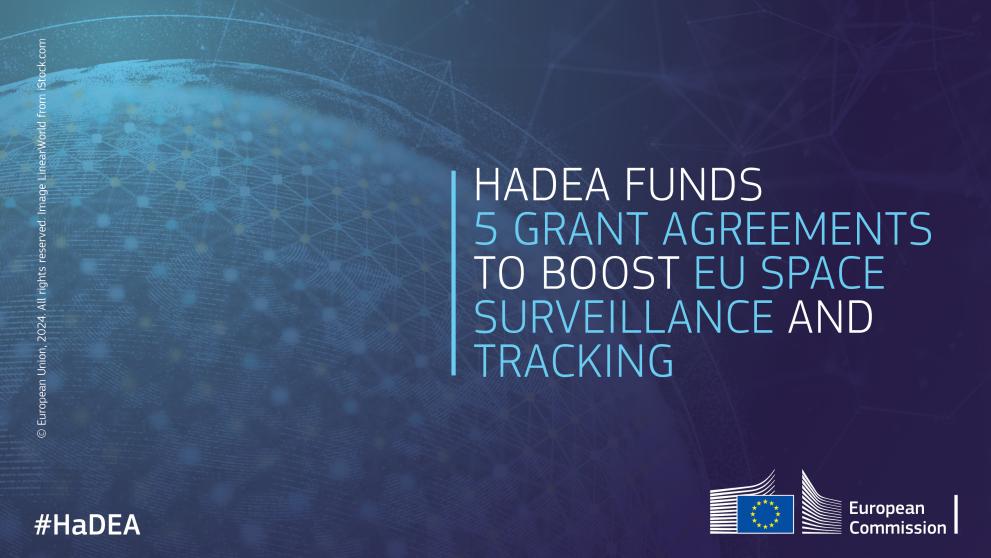
HaDEA completed a set of five grant agreements for new Horizon Europe projects that support research and development for Space Surveillance and Tracking (SST) services. The total budget made available by the EU for the five projects is €52 million.
As the orbital environment has become increasingly congested, the risk of collisions between operational satellites and space debris has become a growing international concern. To address this risk, SST aims to provide the capability to detect, track and catalogue orbiting objects. EU SST is implementing such a SST capability at EU level (see this explanatory video).
The five Identified Beneficiary Actions funded under the Horizon Europe Work Programme 2023-2024 – Cluster 4 are:
1) New & improved EU SST Missions and Services
The consortium is planning to improve the SST services Collision Avoidance, Re-entry, and Fragmentation by releasing more accurate products addressing manoeuvre detection and fragmentation break-up models. Moreover, the use of automatic scheduling observation campaigns will be fostered together with research in the areas of space objects attitude estimation and Radio Frequency (RF) signals detection and prediction.
2) SST & Space Traffic Management (STM) system architecture and evolutions
The R&D activities in this project will provide EU SST with improved architecture design environment by implementing the digital twin concept and further improving the simulators. Moreover, research activities will complete an updated horizon scanning activity for SST capabilities and technologies. The project will also support the possible enhancement of EU SST autonomy regarding space population awareness, further implementing long-term statistical/stochastic propagation. It will assess the accumulated risk for a satellite (or constellation) overall the duration of the mission.
3) Space-based SST (mission, system and sensors network)
The project will focus on benchmarking technology capabilities and performances for Space-based SST applications, optimising on-board/on-ground computations and shaping future SBSS mission contributing to EU SST. In this regard, the research activities will assess image processing performance regarding different observation strategies, implement and evaluate lossless algorithm performance for data compression. Simulations of on-board/on-ground activities will support the recommendations on reference orbits and on-board technologies.
4) SST Sensors and Processing
Activities in this project are focused on the upgrades of several sensors, radars, and telescopes, to increase their performance and operational availability. The improved sensors will then be integrated with the EU SST network thus increasing the overall system capacities.
5) SST Networking, Security & Data sharing
This project aims to develop research activities to build a secured and resilient EU SST network and data sharing. New solutions for links and protocols supporting the data exchange will be investigated. The EU SST database and catalogue will be further developed to provide EU SST user with an optimised and more secure access to EU SST services and data.
Background
EU SST is a subcomponent of the Space Situational Awareness (SSA) programme under the EU Space Programme. It aims to improve, operate, and provide data, information and services related to the surveillance and tracking of space objects that orbit the Earth.
The “identified beneficiary” of this project is the European Union Space Surveillance and Tracking Partnership (EU SST Partnership) which was established in this format in November 2022. It is based on the cooperation of 15 Member States: Austria, Czech Republic, Denmark, Finland, France, Germany, Greece, Italy, Latvia, the Netherlands, Poland, Portugal, Romania, Spain and Sweden. Each Member State is represented by one participant, which could be a space agency, a ministry of transport, a ministry of economy, a ministry of science, a ministry of defence, or research institutes. Predecessor projects involved smaller numbers of states.
The Horizon Europe research projects support the evolution of the parallel project under the EU Space Regulation that is dedicated to the operations of the EU SST system and the service provision to its customers.
Details
- Publication date
- 9 February 2024
- Author
- European Health and Digital Executive Agency
- Programme Sector
- Space
- Programme
- Horizon Europe
- Horizon Europe Cluster 4: Space
- Tags
- EU financing
- Innovation
- Scientific research
